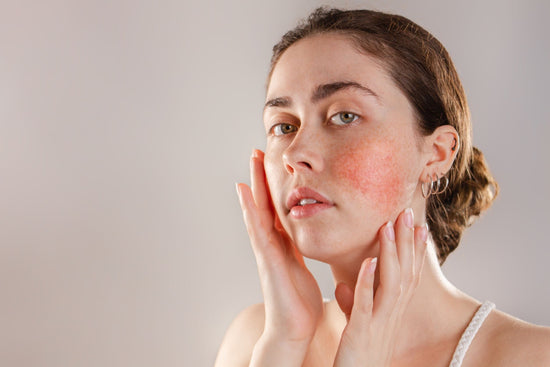

Introduction
Skin inflammation can be a frustrating and uncomfortable condition caused by skin sensitivity and sensitivity to certain ingredients in skincare products. From redness and itching, to swelling and irritation, the symptoms can range from mild to severe. Understanding the root causes of skin inflammation and identifying potential triggers is crucial for maintaining healthy skin, especially for those with sensitive complexions. This comprehensive guide delves into the various skincare ingredients known to provoke inflammatory responses, categorizing them based on their mechanisms of action. Additionally, it recommends potent anti-inflammatory ingredients that can help soothe and protect sensitive skin.
Table of Content
What is Skin Inflammation?
Skin inflammation is your body’s response to perceived threats, and sometimes those threats include skin care ingredients and products. If you use the wrong products, you might experience redness and stinging. There are multiple ways that different substances can irritate sensitive skin, from triggering allergic reactions to causing increased burning from the sun. Sensitive skin is more likely to become inflamed from ingredients like detergents in comparison to resistant skin. Keep reading to find out which ingredients to avoid if you have sensitive skin! If you are simply looking for a great anti-inflammatory moisturizer for sensitive skin , here are a few of our favorites:
Irritating Ingredients to Avoid
Knowing which ingredients might irritate your skin can help you choose better products, especially if your skin reacts easily. Listed below are four of the most common causes of skin inflammation, and the ingredients within each category that could induce an inflammatory response.
Allergens: Triggers of Skin Reactions
Allergies in skincare occur when your immune system overreacts to a foreign substance, treating it like a threat. Here are some common types of allergenic ingredients that can cause skin inflammation:
1. Fragrances and Preservatives: Fragrances contain a complex mixture of chemicals, some of which can act as sensitizers. Repeated exposure to these sensitizers can cause the immune system to become hypersensitive, leading to allergic reactions. Preservatives like parabens, formaldehyde releasers, and isothiazolinones can trigger an immune response in susceptible individuals, leading to contact dermatitis or other allergic reactions.
2. Metals/Nickel: Metal allergies are quite common, with nickel being one of the most frequent culprits. Nickel is present in many everyday items like jewelry, zippers, buttons, and even some foods. For those with metal allergies, prolonged skin contact with these items can result in an inflammatory reaction, such as itching, redness, swelling, and even blistering or eczema-like rashes.
3. Animal Products/Lanolin: Lanolin is the sheep’s skin oil (just like humans have oil on our skin). Many animal-derived ingredients, such as lanolin, collagen, and keratin, contain proteins that can act as allergens. The immune system in some people may recognize these proteins as foreign substances and mount an allergic response. Additionally, animal-sourced compounds may contain impurities or contaminants, such as residual proteins, chemicals, or microorganisms, which can trigger allergic reactions or skin inflammation.
There are many more allergens in the world, but those are some of the most common types of ingredients that are known to trigger allergic reactions in the skin. It’s important to note that generally, if you are allergic to something on its own, you are probably allergic to it in skin care as well. This means nut oils, herb oils, and certain animal compounds are just as dangerous to those with allergies in skin care products as they are in foods.
Irritants: Direct Causes of Inflammation
1. Sulfates/Detergents: Sulfates, such as sodium lauryl sulfate (SLS) and ammonium lauryl sulfate (ALS), are commonly used as detergents and foaming agents in skin care, hair care, and personal care products. They can disrupt the skin's protective barrier, stripping away natural oils and moisture, leading to dryness, irritation, and skin inflammation. Their surfactant properties can also cause direct irritation to the skin cells.
2. Menthol: Menthol is a compound found in peppermint and other mint plants, often used in skincare products for its cooling and tingling sensation. However, menthol can be irritating to some individuals, causing stinging, burning, or skin inflammation, especially when used in high concentrations or on sensitive skin types.
3. Acidic Ingredients: Ingredients with low pH levels, such as alpha-hydroxy acids (AHAs) like glycolic acid and lactic acid, can cause skin irritation and inflammation, especially when used in high concentrations or on sensitive skin. These acids can disrupt the skin's natural acid mantle, leading to dryness, redness, and potential barrier damage.
4. Physical Exfoliants: Physical exfoliants, such as scrubs containing nuts, shells, or other abrasive particles, can cause micro-tears and abrasions on the skin's surface. This physical trauma can lead to skin inflammation, redness, and increased sensitivity, especially if used too vigorously or on already compromised skin.
Photosensitizing Ingredients: Increased Sensitivity to Sunlight
Photosensitizing ingredients like retinoids (vitamin A derivatives) and citrus oils can cause skin inflammation and irritation when exposed to sunlight or other sources of ultraviolet (UV) radiation.
1. Retinoids: Retinoids, such as retinol, retinaldehyde, and retinoic acid, increase the skin's sensitivity to UV radiation. This is because retinoids thin the outermost layer of the skin (stratum corneum), making it more vulnerable to UV damage and subsequent inflammation. When retinoid-treated skin is exposed to UV light, it can trigger inflammatory reactions, including redness, burning, swelling, and peeling.
2. Citrus Oils: Citrus oils, like bergamot, lemon, and lime oils, contain compounds called furocoumarins, which are naturally occurring photosensitizers. Furocoumarins can absorb UV radiation and generate reactive oxygen species that can damage skin cells and trigger inflammatory responses. When applied to the skin and exposed to sunlight, citrus oils can cause phytophotodermatitis, a condition characterized by redness, burning, swelling, and hyperpigmentation.
Comedogenic Ingredients: Pore-Clogging Substances
1. Coconut Oil: Though popular for its moisturizing benefits, coconut oil is high in saturated fatty acids like lauric acid, which can solidify inside pores and form clogs. The molecular structure of coconut oil makes it more likely to be absorbed into the pore lining, leading to blockages which can cause acne and skin inflammation.
2. Palm Oil: Similar to coconut oil, palm oil contains a high proportion of saturated fatty acids like palmitic acid, which can solidify and accumulate in pores. The heavy, occlusive nature of palm oil can trap sebum and dead skin cells within pores, facilitating comedone formation. It may also cause inflammatory reactions in some individuals due to potential contaminants or impurities.
3. Isopropyl Myristate: Used as an emollient and thickening agent in many skincare products, Isopropyl Myristate is a synthetic ester with a heavy, oil-like consistency that can easily penetrate and clog pores. Its occlusive nature can trap sebum, dead skin cells, and bacteria within pores, creating an ideal environment for acne formation. It can also lead to skin inflammation, and irritation- particularly for those with acne-prone or oily skin.
4. Cocoa Butter: Rich in fatty acids like oleic acid and stearic acid, Cocoa Butter can penetrate pores and solidify, leading to blockages. The thick, heavy consistency of cocoa butter can create an occlusive layer on the skin, trapping sebum and debris inside pores leading to an inflammatory response- like acne.
Soothing Ingredients for Inflamed Skin
After avoiding irritants, incorporating soothing ingredients into your routine can help manage inflammation. Below is a list describing 20 common and efficacious anti-inflammatory ingredients.
- Aloe Vera: Known for its soothing and healing properties, great for treating sunburns, cuts, and other skin irritations.
- Argan Oil: A Moroccan oil rich in beneficial compounds that repair the skin barrier, soothe inflammation, and help keep skin pigmentation even.
- Arnica Montana: Known for its ability to reduce swelling and improve wound healing.
- Bisabolol: A natural extract from chamomile, known for its calming effects that reduce irritation and redness.
- Calendula: Has natural anti-inflammatory and healing properties that help soothe eczema and relieve diaper rash.
- Chamomile: Contains several antioxidant compounds, including alpha-bisabolol, an anti-inflammatory compound that helps reduce irritation and soothe the skin.
- Cucumber Extract: Known for its hydrating and anti-inflammatory properties, making it ideal for calming irritated skin.
- Feverfew: Contains antioxidants that help reduce inflammation and calm redness, often used in products for sensitive skin.
- Green Tea Extract: Rich in antioxidants, specifically epigallocatechin gallate (EGCG), which is known for its anti-inflammatory effects.
- Licorice Extract: Contains Glycyrrhizin and licochalcone A have strong soothing and anti-redness effects on the skin.
- Madecassoside: Derived from Centella Asiatica, used for its soothing properties and to repair the skin barrier.
- Niacinamide (Vitamin B3): Helps reduce redness, minimize enlarged pores, improve uneven skin tone, and strengthen a weakened skin barrier.
- Omega Fatty Acids (Omega 3 & 6): Essential for maintaining skin health, reducing inflammation, and supporting the skin’s barrier function.
- Oatmeal (Colloidal Oatmeal): Contains avenanthramides, compounds that reduce inflammation and soothe itchiness.
- Squalane: A highly-effective emollient and natural antioxidant that hydrates and soothes without irritation.
- Tea Tree Oil: Known for its anti-inflammatory, antimicrobial properties that make it a popular choice for treating acne.
- Turmeric (Curcumin): Well known for its anti-inflammatory and antioxidant properties, which help reduce redness and calm skin conditions like psoriasis and acne.
- Willow Bark Extract: Contains salicin, an anti-inflammatory agent that can also act as a gentle exfoliant.
- Zinc Oxide: Often used in mineral sunscreens and products for sensitive skin due to its soothing and anti-inflammatory properties.
Best Products for Soothing Skin Inflammation
VMV Hypoallergenics Red Better Cleanser and Moisturizer.
With over 75 published (even awarded!) studies in medical journals and conventions — including the first and only hypoallergenic “grading” system — VMV HYPOALLERGENICS offers the safest, most proven effective care for sensitive and inflamed skin in the industry.
Rich in calming, soothing monolaurin and other coconut medium-chain-triglyceride derivatives; intensive hydrators like virgin coconut oil and glycerin: plus deeply soothing antioxidants green tea + rice phytic acid. This rich yet pore-friendly cream cleanser helps keep "angry" skin soft, comfortable, quiet, and relaxed.
Helps soothe and calm red, dry, rosacea skin using a nourishing formula.
Senté Repair Duo: Bio Complete Serum + Dermal Repair Cream
Senté is the first and only company to develop a version of Heparan Sulfate and infuse it into medical-grade skincare products. Their exclusive, multitasking Heparan Sulfate Analog molecule is clinically shown to target the underlying causes of skin inflammation and enhance your skin’s natural ability to repair itself.
This duo combines the Bio Complete Serum, a gentle formula that helps diminish fine lines and uneven texture for smoother, more radiant skin, and the Dermal Repair Cream - a deeply nourishing moisturizer formulated with patented Heparan Sulfate Analog Technology and Green Tea Extract to comfort, restore, and protect even the most delicate complexions. Together, this comprehensive duo rejuvenates, hydrates, and safeguards your sensitive skin.
Replenix Sensitive Skin Product Line: Green Tea Gentle Soothing Cleanser
Replenix (Sensitive) products are infused with the most advanced, ultra-soothing dermatologist-developed ingredients of unprecedented purity, potency, and stability to calm redness, irritation, and inflammation on sensitive skin, including rosacea and post-procedural skin.
This creamy, soap-free cleanser is scientifically formulated to gently cleanse and moisturize the skin without drying. Powerful, yet soothing antioxidants, including our proprietary Green Tea Polyphenol Technology and medical-grade Vitamins A, C, E, work together to help minimize free-radical damage. Ideal for highly sensitive and post-procedural skin, this advanced cleanser nourishes and soothes, minimizing redness and inflammation.
Conclusion
Understanding which skincare ingredients to avoid and which to use can significantly improve your skin’s health. It’s important to recognize ingredients that may cause skin inflammation and replace them with ones that nurture and calm your skin. By carefully selecting your skincare products, you can enjoy a clearer, more comfortable complexion.
Thanks for checking out this blog on Exclusive Beauty! Now that you know which ingredients cause inflammation on sensitive skin, you are that much more in control of your skin care journey! Check out the rest of the blogs on our website for even more tips, tricks, and skin care science.

Related Readings
- Choosing a selection results in a full page refresh.










